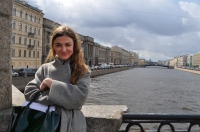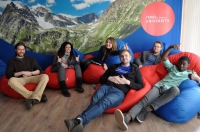When it comes to all things international, ITMO University has been making leaps and strides in this direction. A few years ago at ITMO, there was a small number of English language staff and a few hours a month when students could engage in some English language study. Over the last few years, the Foreign Language Training Center at ITMO University has been pushing forward all things English, so it’s no longer a pastime but a significant part of each ITMO student’s education. Science and research is not something that we want to or can keep local, we want to share our innovations with the world and learn from the wealth of knowledge that already exists, and right now, the English language is a fundamental tool for this development.
So we’ve moved forward qualitatively and quantitatively. On the quality side, this looks like new highly-skilled English teachers, from various backgrounds, offering students more than just translating texts but rather fostering a nurturing environment and a communicative approach. It means, teaching English to staff of the University, so they can create a comfortable English language environment for international students who come. If we just look at the numbers, it’s growing every year, from 200 students in our pilot program in the fall of 2014, to 1,400 students in the fall of 2015, and this year opened up to 3,000 students, so it means lots of new classrooms, lots of new teachers, and a lot of English!

Joshua is currently working as an English language teacher at ITMO University, and is known as one of the "native speakers", a term used in Russia, usually for native speakers of English, something akin to a celebrity. Native speakers are an important part of the new English language curriculum at ITMO since it gives students a chance to hear different English language accents and learn the intricacies of the language.At university, he majored in Russian Area Studies at Dartmouth College, so the first time he came to Russia was for a study abroad program. Since he enjoyed St. Petersburg so much, he felt he had to return and spend some time here after completing university to understand the culture and continue to develop his language skills. He spent two years at a Private Boarding School in Pavlovsk and is now working full time at ITMO University, helping so many bright, talented ITMO students learn to communicate in English, creating opportunities for them to study abroad, much like he learned to speak Russian while in the U.S. "I decided that I wanted to start teaching more intensively at a higher level, than what I was able to teach at the school, I wanted to use Business English, and on headhunter I stumbled upon ITMO and decided to apply", he explains.
According to Joshua, St. Petersburg is one of his top 4 cities in the world, the list also includes Seattle, Montreal and Boston. About St. Petersburg he says, "I love the architecture, I kind of like the rainy atmosphere because it’s very similar to what we have in Seattle, especially when you have a coffee from Starbucks. Starbucks on a rainy day in St. Petersburg makes me feel at home."
Until you move to another country and really immerse yourself in the language and culture, you can’t really form an accurate impression of a place or its people, beyond hearsay. So we asked Joshua, whether he thinks people have an accurate impression of Russia in the U.S. He says, "No, sometimes I think a lot of Americans have a very cold war like view of Russia, it’s been 26 years since the end of the cold war, but we still sometimes think of Russia as this entity that is an echo of the Soviet Union. Partly it is because Americans want to have some enemy to have a reason to unite against."

Despite such sentiments which may exist back home, Joshua enjoys living here and notes that he has seen many similarities between Russians and Americans. One example he shares is that both Americans and Russians are hard workers, they have a desire to work and earn a living for their family and support them. This might sound obvious but it is in contrast to cultures that, for example, take long siestas. Here, and in the U.S., if you have a job, you are going to do your best do it, and do it well, and looking at the staff at ITMO that he has come across, this is evident.
He also says that "There is a stereotype that Russians are inhospitable, and are cold and don’t smile, but once you get through that initial layer, they are extremely hospitable. After only knowing someone for a short time, they helped me with my paperwork and someone else helped me move house. As soon as there is an emotional friendly connection, they are willing to do a lot for you."
When it comes to Russian food and drink, Joshua says he loves kvass, a traditional Russian drink usually made from bread. He also enjoys borsch, blini, and olivieh and vinegret salads. However, he doesn’t like, nor does he ever want to try kholodets, which he explains as "jellied meat".
The only thing Joshua regrets is that he didn’t have a better grasp of Russian before he came, but that’s also a part of the reason why he came after all. He says that when he arrived he tried "not to have expectations and stereotypes, and experienced the culture as if he was a child taking his first steps".




